Please follow me on telegram, as my twitter account was suspended for “ban evasion:” https://t.me/astralplanewalker
Cultural narratives, such as mythology and shared history, are the genetic code of a given society. This mythological DNA structure determines the shape of beliefs and modes of being of the people who live out the ideals of those myths. Throughout American culture right now, we are seeing an “overcoding” of cultural myths and popular media to create the impression that “marginalized” or minority people and ideas have always been front and center, and that ideals currently out of favor with the woke mainstream have always been on shaky ground. This is in fact happening to all of world history, where we see burial remains interpreted in such a way as to make it look like non-binary or transgender peoples were the norm in pre-modern societies, or that women played the same roles as warriors that men did in traditional societies. In addition to the LGBTQ and feminist agenda being written in to history, so too is the presence of minorities insinuated into medieval European society as if they were a common sight in the ports and cities of all medieval kingdoms. And of course, where there is no evidence of any of the above found, male relationships of even the recent past are simply coded as “gay” or, at the very least, “homoerotic.”
Genetic code springs up spontaneously or independently, and then life-forms take shape around it according to its programming. Alexander the Great, for example, idolized the heroes of the Iliad, and Julius Caesar idolized Alexander. The Classical World formed itself around the myths of Homer, just as the Christian West found its form in trying to imitate Christ, and found meaning in the stories of the Bible. Both Homer and the Bible gave form to millennia-long civilizations, but after a time the culture goes off script, the code runs out, and new stories come in to replace them. Organically, this process takes a long time. The Bible was around for centuries before it became the code for the West after the hero and adventurism of Homer faded. We live now in a time more or less coded by pop culture, but pop culture held up traditional norms until very recently, at least in terms of gender roles, male relationships, and racial distribution. But now there seems to be a concerted effort to overtly “overcode” the existing norms in a perpetration of cultural erasure to imply that these woke ideals had always been with us.
Think for example of Disney trying to pass off a black actress not as simply a black mermaid, but as the character of “Ariel.” Surely there must be other black mermaids that this young woman could have played? If you think it through though, even this doesn’t make that much sense. Brown and black skin is the result of excessive production of melanin due to generational exposure to year-round sunlight. The sun never reaches under the sea though, so how do these mermaids become black? Questions like these may seem irrelevant, but to nerd culture, world building is typically an integral part of the experience. However, one may forgive the show runners for overlooking this by making recourse to suspend disbelief. Now think of The Rings of Power. We see the same exact thing here, a black actress playing a character whose race has spent generations living underground in caves and mines. How did these characters end up with black skin? Did they come from somewhere else? If so, why can one breathe underwater and why does the other one look exactly like the other dwarves in stature and proportion? Perhaps one can suspend disbelief once, but all of sudden we’re being asked to do so on multiple fronts at the same time.
What we have to keep in mind is that by writing the black characters into the story, or by writing a different story in the same world as The Little Mermaid or Lord of the Rings, the wokesters wouldn’t be replacing the cultural heritage of western mythology, they would merely be adding to it. That clearly isn’t enough for them. They don’t want to be a part of western heritage, they want to take it over. What they're trying to do is inject the DNA of their ideology *into* the DNA of our culture and overcode the very fabric of mythology that makes up our shared cultural heritage. This is exactly how a virus works: it injects its code into the DNA of the host to get the hosts DNA to stop replicating itself and begin replicating the viral DNA. If the hosts immune system isn’t strong enough, the virus will kill the host. Too bad for the host, but chances are the virus has already spread itself to several others. Combine this viral over-coding with declining birth rates, one wonders where all this is going.
One of the refrains I’ve heard in protest of the female and minority characters added into the Rings of Power Amazon franchise is that Tolkien’s world allowed for people of color and women, but the show runners chose instead to replace male or white characters with women and brown characters. I personally would have no problem, in fact I would rejoice in, a show focusing on Galadriel, nor would I begrudge a story incorporating already existing brown-skinned races of Middle Earth. What I cannot abide however is the attempt to rewrite the entirety of the world Tolkien meticulously crafted to suddenly try and pass it off as a place in which women warriors routinely defeated foes in combat or that the elves and dwarves were a mixed-race people. This is simply not the world Tolkien created.
Certainly, women and brown people play a role in the rich tapestry of our civilization, but it’s simply a fact that it was a marginal role with no significance to the “story” of the history of the west, except of course as a curiosity in the case of an exceptional female ruler like Elizabeth or successful military man like Othello. Even when the BBC tries to tell us that “Africans were a significant presence in cities such as London, Plymouth and Bristol, but were also present in: Derby, Leicester, and Northampton. Africans also lived in rural villages such as Barnstable (North Devon), Holt (Worcestershire), and Hatherleigh (West Devon),” they go on to tell us that they were “servants,” “ladies of the bedchamber,” and even “favorite lytle Blackamores.” But to rewrite a story, be it historical or mythological, to have major players as black in a race of traditionally white peoples is both an attempt to take control of a host and overcode its genetic makeup to serve an alternate agenda, like a virus, and because it’s so out of place narratively, it’s also an eyesore. Why weren’t the subsequent races of dwarvs and elves mulattos? Why did the military exploits of Galadriel, one of the most popular characters in the series, never make it to the volumes Tolkein and his son Christopher dedicated to the history and lore of middle earth?
The Reappropriation of Fight Clubs Legacy
This insertion of racial and gender incongruence into the canon of beloved myths of the west seems to be ramping up, but its not the only way they’re trying to overcode our culture. The reinterpretation of archaeological remains is only one way of making it look like woke ideals have always been the norm. Another way is for them to wrestle the historical impact of cultural milestones away from the people it affected and reassign its significance. One great example of this is Fight Club, which is being purposefully misremembered and misinterpreted to fit specific liberal and woke narratives of the last 20 years. Rather than retelling the story to make one of the main characters black or a woman, commentators are trying to change the message of this film to fit the feminist/LGBTQ agenda, and some believe that because Chuck Palahniuk is gay, he must have had their interpretation in mind when writing the book, and that this interpretation applies to the film. And because some of this misremembering is happening on a grassroots level, of sorts, it shows that the woke virus has spread beyond the supposed shapers of cultures and matriculated out into the population. We already know this of course, the source of wokeness is sort of nebulous in that it spread out of the universities, took on a life of its own online, then migrated into the halls of the Cathedral like mainstream journalistic outlets, human resource departments, and schools. Now it’s infecting a whole new generation of people who are reinterpreting all pop culture as delivery devices for woke ideals.
Two hundred and twenty thousand “likes” on a tweet so egregiously misreading the film it almost seems on purpose. While this is simply a tweet fired off by a nobody, its “viral” status tells us something about how our culture is misremembering its icons. What exactly this tells us can’t accurately be determined by this tweet alone, but we have to at least take its popularity as an endorsement. What it means is either people who were around when the film became a cultural powerhouse believe its impact was born out of a misunderstanding of the film, or subsequent generations are reading the film retrospectively through the lens of the 2016 election and the woke tidal wave that washed over America. Or perhaps we can take both impressions from the tweet. In either case they see it as a gay story and, at least according to this tweet, consider its endorsement by non-woke and the right as a misappropriation of the film. What this tweet is also claiming, and that 220 thousand people apparently agree with, is that the masculinity in the film is the target of its satire.
In an attempt to get an idea of how widespread this analysis of the film was, I read several reviews spread out over the last twenty years. While doing so was a worthy endeavor on its own, I did find several instances in which the film was interpreted as “homoerotic,” and not simply because of the sweaty male-on-male contact either. One reviewer, from Jezebel (of course), refers to the relationship of Brad Pitt and Edward Norton as one of unrequited homosexual desire on the part of Edward Norton, and in fact I was able to find quite a number of interpretations like this. Elsewhere, in fact even more often than the homoeroticism, reviewers said the film was a critique of toxic masculinity, in that Tylers program leads to widespread destruction, not to mention its foundation in violence, and that because it’s revealed that the narrator is severely mentally ill and stops Durden at the last moment, the film supposedly portrays this form of masculinity as a dead end. One analysis counters the message taken from Fight Club by offering a novel in which a man finds solace and healing by going to therapy, and another ends with the line “to appreciate it is to reclaim it from creeps on the internet.”
This attempt to overcode the cultural impact of certain masculine stories to fit a feminized version of latent homosexuality or toxic masculinity and male fragility is nothing new. Think for example of the novel Song of Achilles in which a female author writes the story from the perspective of Patroclus. In her telling, she casts him as gay and he and Achilles as lovers. Or think of Emily Wilson’s translation of The Odyssey, in which Odysseus is a “complicated man.” According to Vox, her translation offers “a new way of thinking about it in the context of gender and power relationships today. As Wilson puts it, “the question of who matters is actually central to what the text is about.” Not only is the poem about gender relations and power dynamics, but it has *always been about* those things, according to the woke scribes. They’ve overcoded the story of adventure and heroism that inspired an entire civilization into a critical race and gender studies story of Foucaultian power-dynamics.
However, Fight Club is actually a special case, because unlike Tolkien and The Little Mermaid, which unambiguously did not include brown people, or Ancient Greek poetry, which took for granted the social inferiority of women, Fight Club was in fact written by a gay man, and a gay critique of the film/book is borne out by the text in metaphorical or indirect ways. Is Tyler Durden simply the narrators amorphous Id, or is he the narrators closeted homosexuality? Is the bare knuckle boxing a thinly veiled metaphor for gay sex, or should it be taken at face value? We can explore these questions later, but for now what’s important is that many of the commentators remembering the film are doing so either as a story of unrequited gay tension or a satire of toxic masculinity. What’s worse, it’s legacy is being remembered as one that paradoxically inspired toxic masculinity in a generation, meandering its way through American culture and eventually manifested in things like pick-up artistry, inceldom, and the Proud Boys. If we are to understand it as a parody of toxic masculinity, that would mean an entire generation of men took the wrong message from the film, embracing the violence and ignored the supposed warning at the end.
This, I believe, is merely an attempt to overcode the films cultural relevancy and negate its massive impact, one the woke see as resentful and negative, and supportive of some of the worst things in our society, and of some other completely reasonable developments that they can’t tolerate. Either way, the overcoding of myth and culture must elicit an immune response from those of us who have to live in the society perpetuated by these stories, and in these cases, the immune response is simply the truth: there were no female or trans warriors in ancient civilization or medieval Scandinavia, there were hardly any non-whites in medieval Europe, and Tyler Durden is the hero in Fight Club.
Coming in Part 2…
By examining the film psychoanalytically, we may be able to gain a baseline insight into the story as a whole as a way to understand the forces at play in the narrative. From there, we will spend a little time outlining the homosexual read of the film, and consider that in context of its portrayal of masculinity. Does understanding this movie as a gay metaphor negate its critique of consumer culture and its perspective on masculinity? Which is the stronger read, that Fight Club is a gay movie or that Fight Club endorses Tyler Durden as a male role model regardless? Is he the villain or the hero? Fight Club is a satire, everyone agrees on that, but is it a satire on consumer culture or toxic masculinity and male fragility?
The film appears to have a direct message, and that message was taken up by the intended group of people in America, and I will argue that Fight Club is a cultural milestone whose intentions were understood loud and clear by both its admirers and detractors when the film came out and the subsequent years in which it gained a cult following, but that because of the way cultural and political norms evolved over the subsequent two decades, there’s been a reinterpretation of the film from certain perspectives that say it is not in fact what an entire generation took it to be.

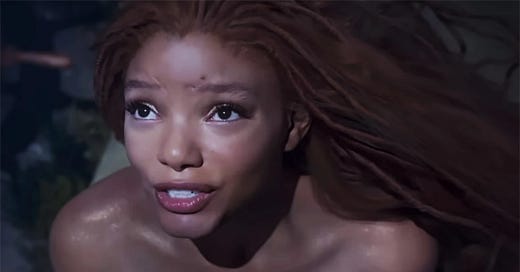



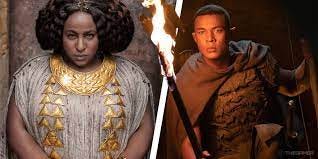
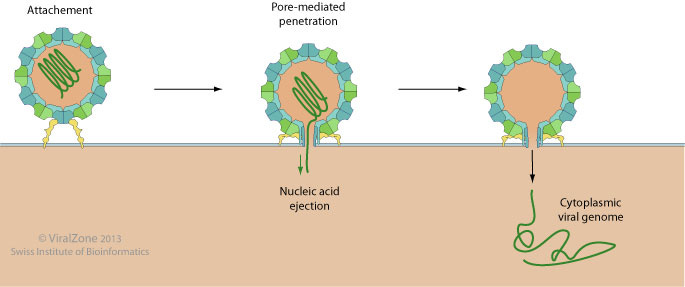
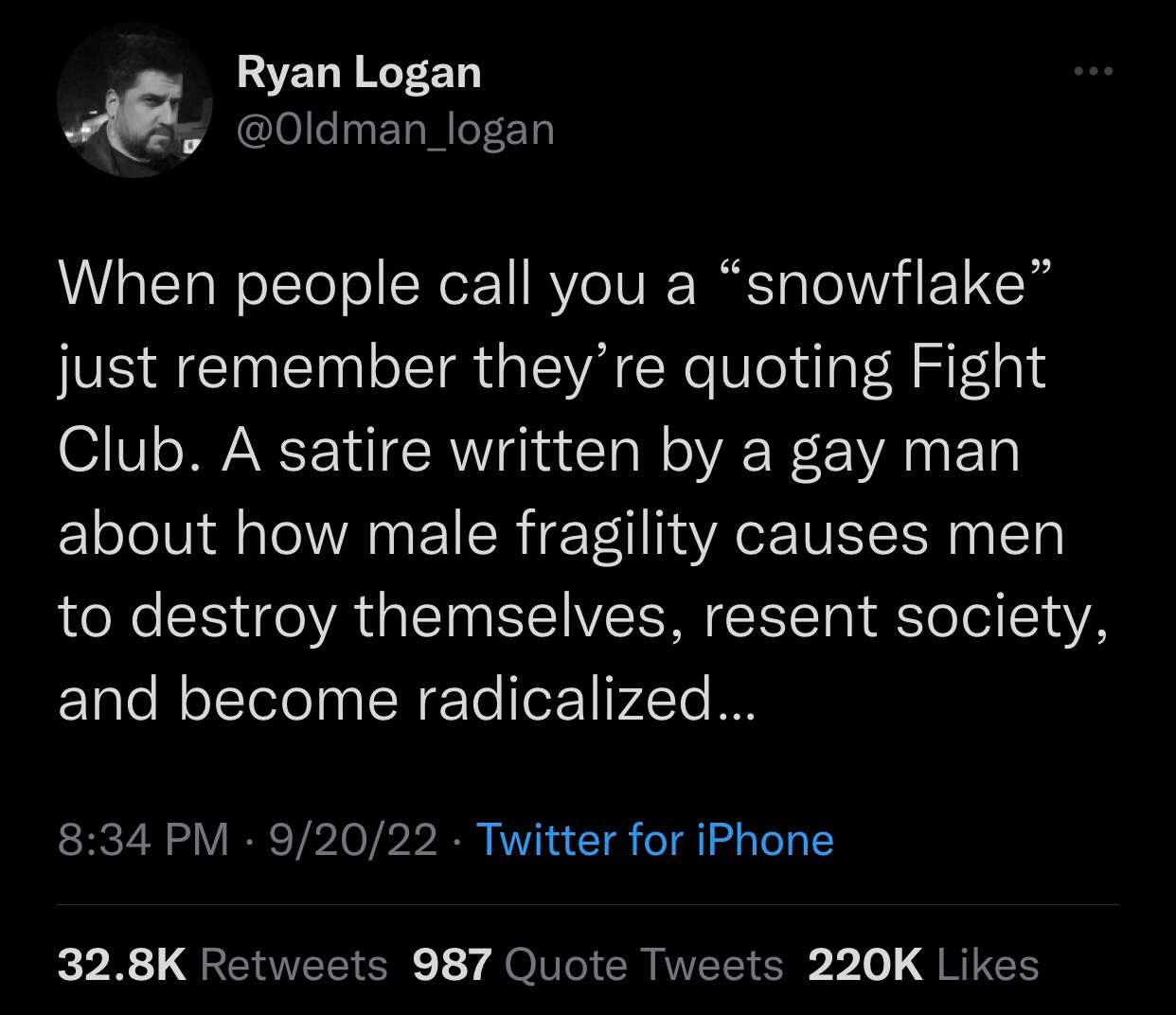

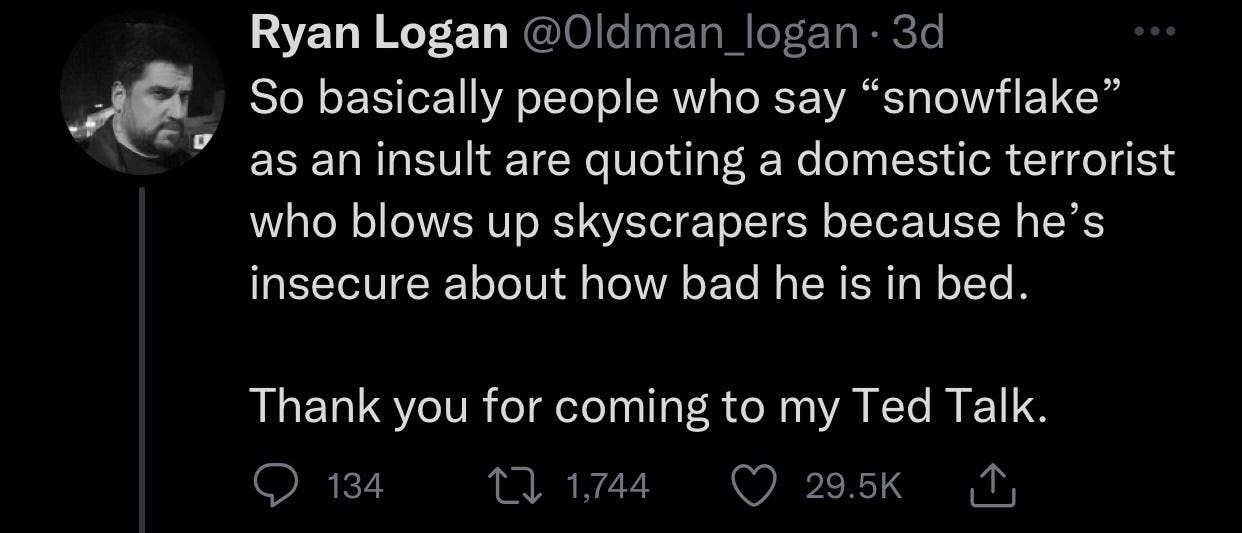
Which part specifically
I love this film but this is an odd take.